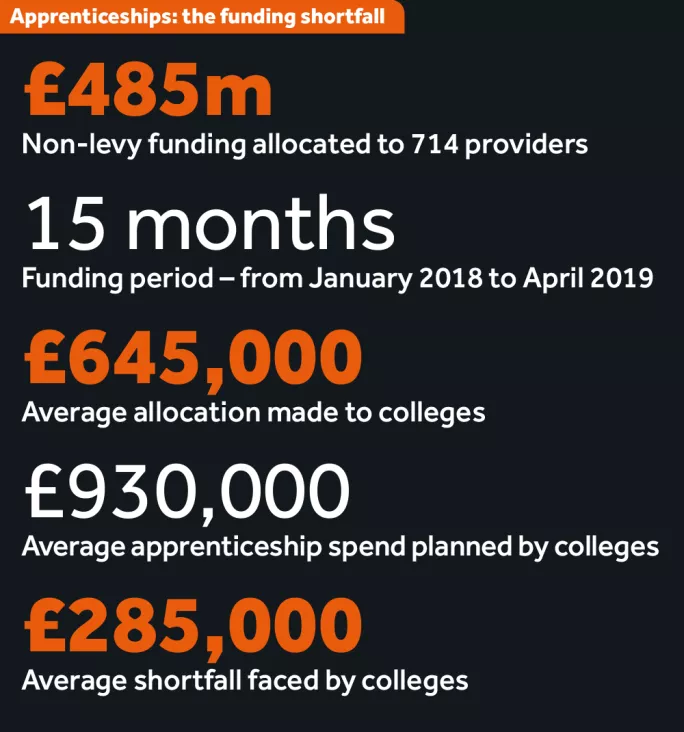Colleges to overspend in a bid to save apprenticeships

Colleges across England are faced with the prospect of having to use their own funds to make up for a shortfall in government allocations to run apprenticeships over the next year.
It is the result of a decision by the Education and Skills Funding Agency (ESFA), which has allocated far less to individual colleges and other providers than they requested to provide apprenticeship training for employers too small to pay the apprenticeship levy: those with a pay-bill of less than £3 million.
The funding, announced in December, covers a 15-month period, which started last month and ends in April next year. Some £485 million has been allocated to 714 providers - more than 200 of whom are colleges. However, the controversial tender resulted in a shortfall between what successful bidders wanted and what was allocated to them. The funding gap ranges from between 30 and 60 per cent across the regions of England, according to the Association of Colleges.
A new survey of colleges across England, conducted by the AoC and shared with Tes, highlights the scale of risk that institutions will be taking over the coming months.

It reveals that colleges will be risking £285,000 each, on average, in ensuring that apprenticeships remain on offer to those who need them, in the hope that the ESFA will step in to cover the overspend.
The gap between what they need to deliver in terms of apprenticeship programmes and what they have been allocated by the government means that colleges will overspend by 44 per cent on average, according to the survey.
‘Forcing colleges to gamble’
Julian Gravatt, deputy chief executive of the AoC, warns: “The non-levy funding system is effectively forcing colleges to take a gamble in spending an average of £285,000 to fund apprenticeships that are not covered by the non-levy allocation”.
He adds: “It has been normal in the past for colleges to take risks with funding and to overdeliver, but the government is putting in place a college insolvency regime and the banks are reluctant to provide short-term lending, so the risk is now much bigger”.
Stewart Cross, director of information and integration at the College of Haringey, Enfield and North East London, says: “Colleges like us are taking a risk - if we overdeliver we will not get the funding. If we get stung by delivering unfunded apprenticeships then we will have to make big cut backs to our non-levy provision”. His college bid for £1.5 million but was awarded £569,413.
Cross adds: “I think it’s widely recognised that the procurement was a bit of a disaster. It was badly done and everyone, not just us, got a lot less then we bid for.”
Colleges are risking incurring costs up front that might not be reimbursed, according to John Widdowson, principal and chief executive of New College Durham.
His college only got around half of what it bid for. However, he believes that more funding will be made available if necessary.
“We are hoping there might be another attempt to get further growth,” Widdowson says. My assumption would be that, because it’s such a high priority for the government, if we can substantiate the demand then government would provide the funding.”
It’s not just colleges that are affected by the funding shortfall. Mark Dawe, chief executive of the Association of Employment and Learning Providers, says: “The impact of hugely reduced contracts alongside the other levy reforms is most adversely felt in the halving of apprenticeship opportunities at level 2 across the country - especially in areas where you won’t find large, levy-paying employers. This makes a mockery of the government’s social mobility agenda.”

Some providers are already having to stop replacing staff who leave, in a bid to stay afloat. Haddon Training bid for £1.5 million but was allocated £832,000. Chris Hewlett, the firm’s managing director, says: “We’ve had to make alterations and we will still be here next year, but it will be quite tough in terms of meeting recruitment numbers and being able to service it with fewer resources.”
Hewlett admits that there is a recruitment freeze at the company: “Some of our staff have emigrated and some have retired. Others have moved on, so we have reduced staff. We had about 72 - I think we’re down to about 54 now.”
He warns: “On the coalface, it’s not easy at the moment. There are training providers that have just handed the keys in and said ‘that’s it, we can’t do it anymore.’”
But others are more optimistic. Malcolm Armstrong, managing director of Access Training Limited, based in the North East, says: “I’m certainly not planning on reducing our efforts or reducing staff in any way.”
His firm bid for £1,044,500 but was allocated £595,559. However, Armstrong thinks that more funding will be released if a business case can be made.
“I’m confident that we will be able to get growth - that as long as we deliver, we’ll have opportunities to go back and say, ‘We are delivering - can we have an increase in our allocation?’”
A Department for Education spokesperson says: “We have awarded hundreds of providers across the country with initial awards totalling £485 million to deliver apprenticeship training for these smaller business. Following a competitive process, all awards were given based on the quality of the tender submitted against a rigorous set of criteria.”
You need a Tes subscription to read this article
Subscribe now to read this article and get other subscriber-only content:
- Unlimited access to all Tes magazine content
- Exclusive subscriber-only stories
- Award-winning email newsletters
Already a subscriber? Log in
You need a subscription to read this article
Subscribe now to read this article and get other subscriber-only content, including:
- Unlimited access to all Tes magazine content
- Exclusive subscriber-only stories
- Award-winning email newsletters